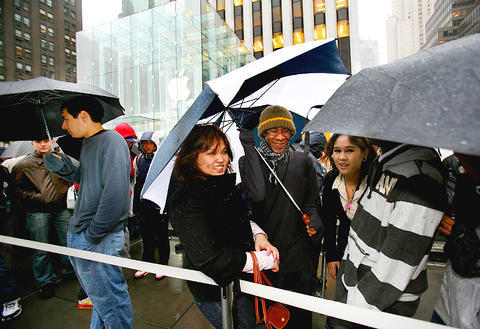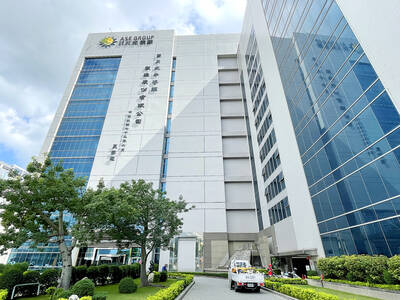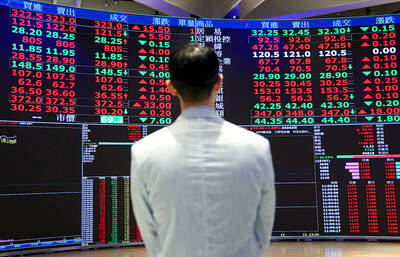Apple Inc's delayed update to the Mac OS X operating system is hitting store shelves as consumers snap up more and more Macintosh computers to complement their iPods and iPhones.
Dubbed Leopard, the upgrade went on sale at 6pm local time at stores around the world on Friday. It offers improvements to an operating system that was already widely praised for its ease-of-use and slick interface.
Leopard boasts more than 300 new features, including one called "Boot Camp" that lets users install Windows on Macs, though both operating systems can't run at the same time. "Time Machine," an automated data backup system, and "Spaces," a way to simultaneously view open applications, are among the other highlighted features.

PHOTO: AP
Macs have reached record sale levels, and the launch of Leopard is expected to bolster a continuing rise.
Computers with Microsoft Corp's Windows platform still dominate the PC market, but Apple has made significant gains over the past year, outstripping the industry's worldwide 15 percent growth rate. Apple, which for years hovered at a 2 percent to 3 percent share of the US market, now claims an 8 percent slice, market researcher Gartner Inc said.
As Apple's iPod players became a cultural phenomenon, they introduced millions of Windows users to Apple's software and design. And the iPhone, Apple's new hybrid cellphone and iPod, is spreading that halo effect.
Also, Apple's 197 shiny retail outlets have become magnets, while Best Buy Co started carrying Macs at some of its stores this fall. Apple says more than half of the customers buying computers at Apple stores are new to the Mac platform.
Existing Mac users can buy the Leopard operating system update separately, and it is being built into all new Macs.
It costs US$129 for a single user or US$199 for a license for up to five machines.
Leopard is the sixth major upgrade Apple has made to Mac OS X since the computer operating system debuted in 2001. The previous major upgrade, Tiger, was released in April 2005.
By comparison, it took Microsoft five years to complete its major Windows upgrade, Vista, which went on sale in January and has been since dogged by complaints of incompatibility problems. Vista comes in different consumer editions, depending on how many features are included, and ranges in price from US$100 to US$400.

EXPANSION: The investment came as ASE in July told investors it would accelerate capacity growth to mitigate supply issues, and would boost spending by 16 percent ASE Technology Holding Co (ASE, 日月光投控), the world’s biggest chip assembly and testing service provider, yesterday said it is investing NT$17.6 billion (US$578.6 million) to build a new advanced chip packaging facility in Kaohsiung to cope with fast-growing demand from artificial intelligence (AI), high-performance-computing (HPC) and automotive applications. The new fab, called K18B, is to commence operation in the first quarter of 2028, offering chip-on-wafer-on-substrate (CoWoS) chip packaging and final testing services, ASE said in a statement. The fab is to create 2,000 new jobs upon its completion, ASE said. A wide spectrum of system-level chip packaging technologies would be available at

Taiwan’s foreign exchange reserves hit a record high at the end of last month, surpassing the US$600 billion mark for the first time, the central bank said yesterday. Last month, the country’s foreign exchange reserves rose US$5.51 billion from a month earlier to reach US$602.94 billion due to an increase in returns from the central bank’s portfolio management, the movement of other foreign currencies in the portfolio against the US dollar and the bank’s efforts to smooth the volatility of the New Taiwan dollar. Department of Foreign Exchange Director-General Eugene Tsai (蔡炯民)said a rate cut cycle launched by the US Federal Reserve

HEAVYWEIGHT: The TAIEX ended up 382.67 points, with about 280 of those points contributed by TSMC shares alone, which rose 2.56 percent to close at NT$1,400 Shares in Taiwan broke records at the end of yesterday’s session after contract chipmaker Taiwan Semiconductor Manufacturing Co (TSMC, 台積電) hit a fresh closing-high amid enthusiasm toward artificial intelligence (AI) development, dealers said. The TAIEX ended up 382.67 points, or 1.45 percent, at the day’s high of 26,761.06. Turnover totaled NT$463.09 billion (US$15.22 billion). “The local main board has repeatedly hit new closing highs in the past few sessions as investors continued to embrace high hopes about AI applications, taking cues from a strong showing in shares of US-based AI chip designer Nvidia Corp,” Hua Nan Securities Co (華南永昌證券) analyst Kevin Su

Nvidia Corp’s major server production partner Hon Hai Precision Industry Co (鴻海精密) reported 10.99 percent year-on-year growth in quarterly sales, signaling healthy demand for artificial intelligence (AI) infrastructure. Revenue totaled NT$2.06 trillion (US$67.72 billion) in the last quarter, in line with analysts’ projections, a company statement said. On a quarterly basis, revenue was up 14.47 percent. Hon Hai’s businesses cover four primary product segments: cloud and networking, smart consumer electronics, computing, and components and other products. Last quarter, “cloud and networking products delivered strong growth, components and other products demonstrated significant growth, while smart consumer electronics and computing products slightly declined,” compared with the